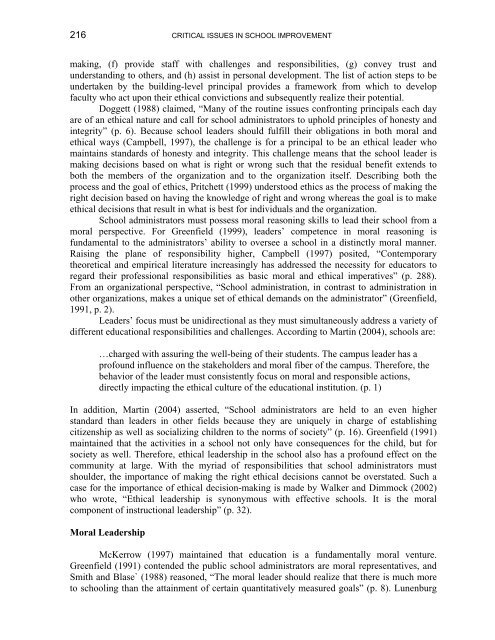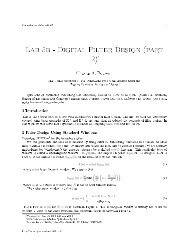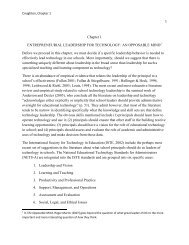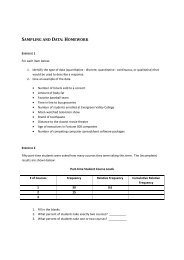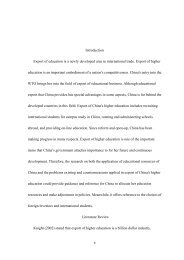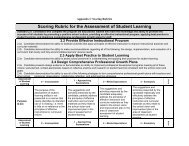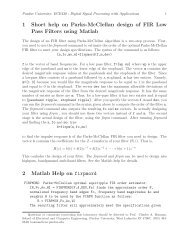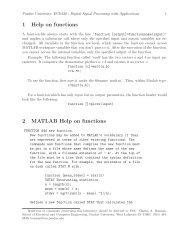Blazing New Trails - Connexions
Blazing New Trails - Connexions
Blazing New Trails - Connexions
You also want an ePaper? Increase the reach of your titles
YUMPU automatically turns print PDFs into web optimized ePapers that Google loves.
216 CRITICAL ISSUES IN SCHOOL IMPROVEMENT<br />
making, (f) provide staff with challenges and responsibilities, (g) convey trust and<br />
understanding to others, and (h) assist in personal development. The list of action steps to be<br />
undertaken by the building-level principal provides a framework from which to develop<br />
faculty who act upon their ethical convictions and subsequently realize their potential.<br />
Doggett (1988) claimed, “Many of the routine issues confronting principals each day<br />
are of an ethical nature and call for school administrators to uphold principles of honesty and<br />
integrity” (p. 6). Because school leaders should fulfill their obligations in both moral and<br />
ethical ways (Campbell, 1997), the challenge is for a principal to be an ethical leader who<br />
maintains standards of honesty and integrity. This challenge means that the school leader is<br />
making decisions based on what is right or wrong such that the residual benefit extends to<br />
both the members of the organization and to the organization itself. Describing both the<br />
process and the goal of ethics, Pritchett (1999) understood ethics as the process of making the<br />
right decision based on having the knowledge of right and wrong whereas the goal is to make<br />
ethical decisions that result in what is best for individuals and the organization.<br />
School administrators must possess moral reasoning skills to lead their school from a<br />
moral perspective. For Greenfield (1999), leaders’ competence in moral reasoning is<br />
fundamental to the administrators’ ability to oversee a school in a distinctly moral manner.<br />
Raising the plane of responsibility higher, Campbell (1997) posited, “Contemporary<br />
theoretical and empirical literature increasingly has addressed the necessity for educators to<br />
regard their professional responsibilities as basic moral and ethical imperatives” (p. 288).<br />
From an organizational perspective, “School administration, in contrast to administration in<br />
other organizations, makes a unique set of ethical demands on the administrator” (Greenfield,<br />
1991, p. 2).<br />
Leaders’ focus must be unidirectional as they must simultaneously address a variety of<br />
different educational responsibilities and challenges. According to Martin (2004), schools are:<br />
…charged with assuring the well-being of their students. The campus leader has a<br />
profound influence on the stakeholders and moral fiber of the campus. Therefore, the<br />
behavior of the leader must consistently focus on moral and responsible actions,<br />
directly impacting the ethical culture of the educational institution. (p. 1)<br />
In addition, Martin (2004) asserted, “School administrators are held to an even higher<br />
standard than leaders in other fields because they are uniquely in charge of establishing<br />
citizenship as well as socializing children to the norms of society” (p. 16). Greenfield (1991)<br />
maintained that the activities in a school not only have consequences for the child, but for<br />
society as well. Therefore, ethical leadership in the school also has a profound effect on the<br />
community at large. With the myriad of responsibilities that school administrators must<br />
shoulder, the importance of making the right ethical decisions cannot be overstated. Such a<br />
case for the importance of ethical decision-making is made by Walker and Dimmock (2002)<br />
who wrote, “Ethical leadership is synonymous with effective schools. It is the moral<br />
component of instructional leadership” (p. 32).<br />
Moral Leadership<br />
McKerrow (1997) maintained that education is a fundamentally moral venture.<br />
Greenfield (1991) contended the public school administrators are moral representatives, and<br />
Smith and Blase` (1988) reasoned, “The moral leader should realize that there is much more<br />
to schooling than the attainment of certain quantitatively measured goals” (p. 8). Lunenburg


